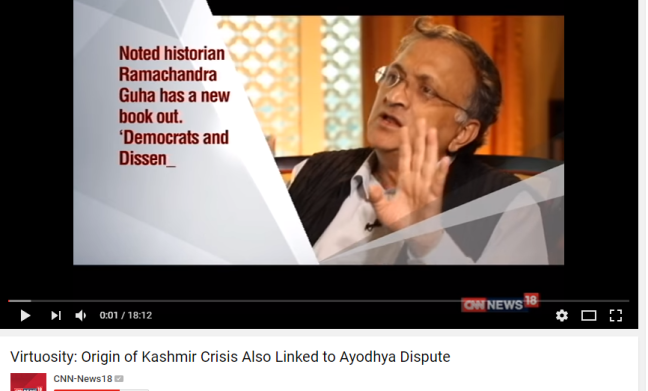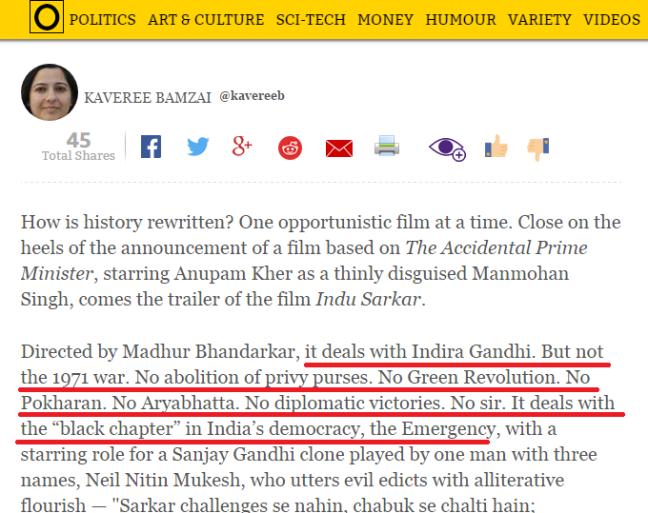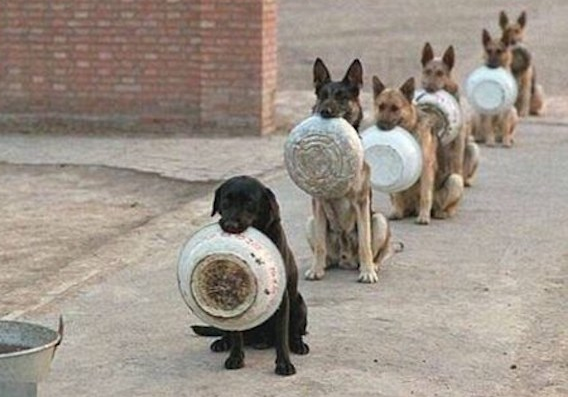In my life I have challenged multiple people to show me ONE … just ONE article anywhere in the media whose main objective is to criticize Sonia Gandhi. I am still waiting.
It’s this vice like grip that the dynasty has over our national discourse. Our school textbooks, our media, our education system have all trained us to treat the Dynasty as above us all. And we do this almost without thinking.
You are probably asking : but what about Rahul Gandhi? There does not seem to be any taboo around criticizing him. Indeed, there does not seem to be any end to the jokes around “Pappu”.
Yes, indeed. The collapse of the “Dynasty taboo” when it came to Rahul Gandhi is a story of technology and democracy coming together at just the right moment.
Go back and think about the UPA years and the massive image building exercise that was mounted in favor of Rahul Gandhi. This kicked into even higher gear after 2009, when Rahul obtained his first and only electoral success ever : winning 22/80 seats in Uttar Pradesh. Now 22/80 is nothing by BJP’s standards (Vajpayee-Advani scored 50+ multiple times, let alone Modi’s 73) but it was enough for the Dynasty’s slaves in the media to sing praises of the Shehzada.
Unfortunately for Rahul, this PR exercise was tried at the exact point when social media was taking wings in India. Between the Shehzada and the social media, only one could come of age. By the time Modi began his 2013 campaign, the jibes that he threw at Rahul Gandhi were only the culmination of years of ground work laid in the social media.
I personally believe that the Rahul image building initiative might have been the biggest failed PR campaign in Indian history. And social media did it. It’s the reason that elite reporters can speak fondly of everyone … from mafia don Shahabuddin to Naxal terrorists… but they can never say something nice about social media.
The elite media will never forgive the social media for what the latter did to the former’s Rahul zindabad campaign.
But the elders in the Dynasty escaped such democratic fury of the masses. Those who got to write history were all court poets appointed by the Dynasty. How else do you explain fantastic claims like these from “eminent historians”?

Of course. Pick Ram Guha’s brain enough and you will discover that even the holocaust happened because of the Ayodhya dispute. Not to mention Jallianwalla Bagh and the great famines in Bengal and the Deccan under British rule.
Under no circumstances blame Nehru. No, there is no way Nehru’s failed diplomatic moves have anything to do with problems in Kashmir. So what if Nehru failed to prevent the partition of India? So what if Nehru failed to even manage the partition once it was decided … which resulted in 3 million people dying!
Nehru makes a deal and 3 million lives are lost under his watch. No way we could blame the Dear Leader, right?
In our national view, Nehru remains forever the peerless diplomat. He just got the negotiations wrong with the British and with Jinnah which cost us the unity of our country. Then, Nehru got a little unlucky in negotiations with Pakistan due to which thousands of our soldiers are dying even today in Kashmir. Also Nehru got it a little wrong with “Hindi Chini bhai bhai” in 1962. Not to mention that Nehru got us to sign up with the Soviets, putting us on the wrong side of history. If you choose to be technically correct, you must say that Nehru led the “Non-Aligned Movement”, which is perhaps the only organization that was a bigger joke than the Soviet Union.
But on the good side, Nehru spoke great English. He won lots and lots of praise from white people.
Don’t let these tiny mistakes meddle with our image of Nehru as a great visionary. So what if he said that the Soviet Union is the “hope of humanity”? He’s still a great visionary… who just happened to see the wrong visions.
We are conditioned to worship Nehru. He is the “Dear Chacha” after all.
Which is why Madhur Bhandarkar’s “Indu sarkar” is a big deal. Here is the trailer that openly invites to Indians to witness a “black chapter in history”; that of the Emergency?
And no sooner had the trailer come out, showing a despotic Indira Gandhi and an out of control Sanjay determined to rule India with the “chabuk” (whip), did the whining begin. Congratulations Kaveree Bamzai, you are the first to jump.

As and when the Dynasty comes back to power, I am sure you will be first in line to collect your reward.

Have you noticed how liberals are fond of throwing around the term “undeclared Emergency” but wince at every mention of the actual Emergency?
Because they don’t want to talk about the actual Emergency where people were actually rounded up and thrown in jail. That would be “communal”. They want to talk about this “emergency” right now… you know the one where you can call the Prime Minister every name in the book and still nothing happens to you.
The question is not why Madhur Bhandarkar is making a movie on the Emergency, the question is why a ton of movies haven’t already been made about the Emergency.
Indeed, why can’t people just stop discussing the Emergency of 1975 and focus on what Golwalkar said about Hitler in the 1930s? That’s a much more convenient conversation for enlightened liberals. Unless you also happen to bring up the fact that Nehru was praising the Soviets right around the time the RSS was praising Nazis.

But then, what are the chances of someone bringing that up? The academic court poets made sure no one heard about the latter. Until this pesky social media thing came along and now suddenly it’s like the intellectuals can’t even get away with blaming the Kashmir problems on the Ayodhya dispute… What a tragedy.

Nice one this, CW. You have a knack of needling the MSM and dynasty sycophants that’s truly unique. I just wish you and folks like you had more reach.
LikeLike
Even when the emergency was imposed, I remember our media was full of “Positive” effects of that drastic measure. The media was full of coverage how there was a shortage of desks and chairs at government offices because before that measure there was always 25-30 percent government servants remain absent, but due to emergency they all started showing up for work and how India’s trains started running on time, students in colleges started showing up for the classes etc. etc.
About 1971 war, it was literally imposed on India because the Pakistani soldiers were committing such an atrocity on East Pakistani people that tens of millions East Pakistani refugees migrated to India occupying thousands of school buildings. It was a situation totally unbearable for India and Indira Gandhi had no choice but to act as her diplomatic cry for help was totally rejected by West, especially the USA.
LikeLike
Nehru “a great visionary… who just happened to see the wrong visions.” LOL.
As for the 1971 war, Indira Gandhi’s role is overhyped. At that time the whole country was clamouring for the Army to move into Bangladesh and end the crisis. The millions of refugees had pretty much overwhelmed the Eastern states of WB, Assam, even Meghalayaya and Tripura. The whole of India (more or less, not counting the usual suspects) wanted it even in April but Eastern Command was firm they wanted time to prepare and would only act in late November. It was a well planned campaign and ran pretty much according to plan. They hoped to take Dhaka in 3 weeks. The war started on 3 Dec and Dhaka surrendered on 16 Dec.
But the war on the Western front didn’t go so well. We lost strategically important territory in Chhamb. It’s still with the Pakis and IG couldn’t get it back in the Shimla negotiations. But she did give back all the Paki territory taken in the Shakargarh sector. India had more or less flattened the Shakargarh bulge along the Kathua-Samba-Hiranagar border. This area is from where the Pakis now keep sending their terrorists into India for attacks on Kalu Chak, Hiranagar, Dinanagar, Pathankot etc. Not to speak of all the smugglers and spies who use this border. After the Dhaka surrender we had battle hardened divisions (and flush with victory) all free and eager to move to the Western theatre and finish the demoralised Paki defences there. What did the “Iron Lady” do? Ended the whole victory march in a cease fire. A week more would have broken the Paki’s army’s back. Sure, the whole world including the friendly Soviet Union wanted a cease fire but it was up to the Indian govt to manage the worldwide fuss and let the Indian Army finish the job.
They didn’t. IG was more interested in calling elections quickly and cash in on the Bangladesh victory.
LikeLiked by 1 person
Ayodhya caused Kashmir problem…That had me cracking.
These intellectual will never acknowledge blunders of Dynasty. They will never point the fingers towards the Maa Beta. The dialogue at end sums it all..
LikeLiked by 1 person
One has to give credit to Nehru for his long-term planning. He put in place systems which ensured that Indians would continue to be poor not just during his reign, but also during those of his daughter, grandson, and grand daughter-in-law. This is why NaMo has his task cut out.
A little off-topic, but I have just spent two days with our favourite start-up (my first visit). We decided that our order of priorities would be (i) Dharma, (ii) Bharat, (iii) NaMo (iv) BJP. Any feedback?
LikeLiked by 1 person
Sounds very interesting. Best of Luck.
LikeLike
Thank you!
LikeLike
That sounds awesome. Dharma and Bharat are intertwined, would probably classify them 1a and 1b 🙂
NaMo is a Level 5 leader (a term I borrowed from a management book by Jim Collins “Good to Great”); essentially, it means that by 2024, he will have put structures in place as well as a succession plan which will ensure that Bharat is in good hands even beyond him.
LikeLike
Excellently written as always.
How shamelessly K Bamzai doesn’t hesitate to play the man and indulge in character assassination of the director, actor and all and sundry.
LikeLike
Now I am waiting for a film that would expose the great Gandhi. Dr. Babasahab Ambedkar has already done that in the past. Filmmakers just need to collect all the material written by the father of the constitution and make a film on that.
As far as Bollywood is concerned, RGV tried to touch that with his Gandhian character Rao Saheb, played by Dilip Prabhavalkar, in Sarkar 2. That was brilliant.
LikeLike
Thoda time lagega … have to wait 🙂 Patience!
LikeLike